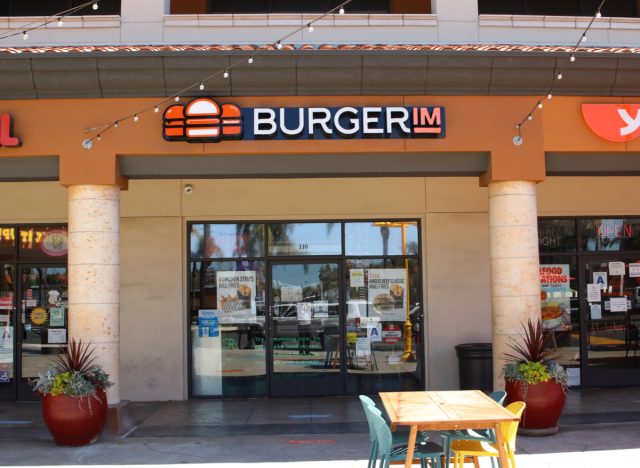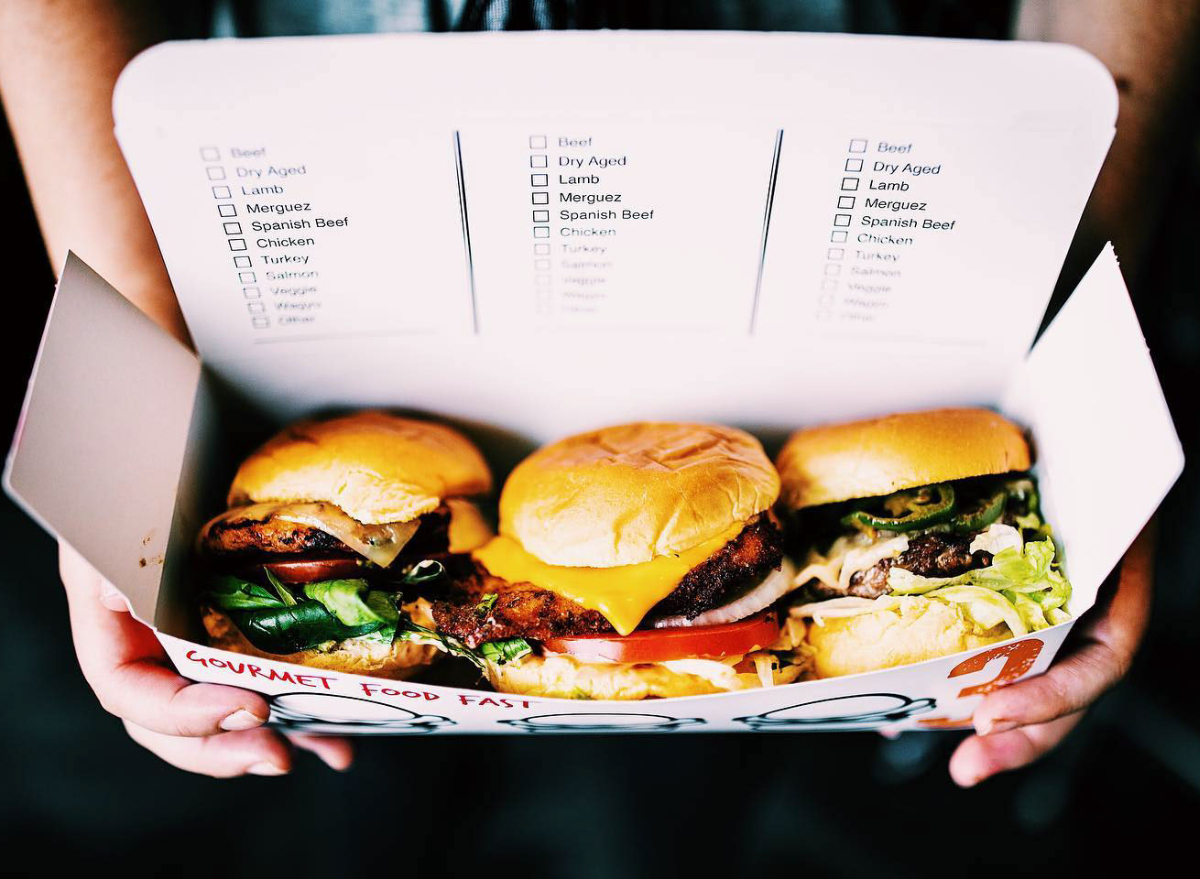This Controversial Burger Chain Is All But Non-Existent Now, Insiders Say
After an epic fall from grace, Burgerim has left many financial victims in its wake. While the once-promising burger chain still exists in name, it is less clear whether there is an actual franchisor behind it today, nor whether its duped franchisees will ever see justice.
Jamal, an operator in Rancho Cordova, Calif. who spoke to Eat This, Not That! and asked his last name be withheld, says his restaurant is one of about 80 remaining Burgerim locations, most of which are struggling to stay afloat. An immigrant from Afghanistan, he signed on to become a Burgerim franchisee in pursuit of the American dream. Still, he considers himself “one of the lucky ones”—he only lost an initial $50,000 franchise fee to the company’s treacherous and now-missing CEO Oren Loni, who fled the country to parts unknown around December of 2019.
Some unluckier operators are facing much bigger debt, after taking out Small Business Administration (SBA) loans worth hundreds of thousands of dollars in order to keep their restaurants going.
And don’t miss 4 Major Pizza Chains Falling Out of Favor With Customers.
Everyone on their own

Burgerim was once considered to be the brand to watch, thanks to its seemingly meteoric rise and rapid expansion. But despite selling more than 1,500 franchises and collecting more than $57 million in initial franchise fees from 2015 to 2019, only 130 locations managed to open through 2018, according to the state of California.
Jamal was one of those that succeeded in opening a Burgerim restaurant. His location was up and running in 2018 and initially attracted strong interest from customers. But he and other remaining franchisees are now “holding on by their fingernails,” due to a confluence of factors plaguing the restaurant industry—from skyrocketing food costs and COVID-related closures to overall inflation. Not to mention, the disappearance of any Burgerim corporate structure and support.
“We’re barely surviving,” he says, adding that if it wasn’t for his development of a good, local customer base, his location would not be around.
Franchisee advocate Keith Miller says it’s hard to know how many franchisees are still out there since “there’s no central company left.” According to industry insiders, as the chain began to implode, some operators decided to take their restaurants out of the chain’s system and try their luck as independents or as parts of other burger franchises.
In 2021, Burgerim seemed to be under the governance of Greg Becker, an interim president and COO. However, according to Jamal, Becker no longer seems to be representing the company in any way.
“Is there really a franchise anymore? Calls to the company’s Calabasas headquarters are not answered and haven’t been for some time,” Miller notes. “Everyone is basically on their own now.”
The collateral damage
But even when Burgerim still was an operating company, franchisees were skeptical of its support.
“Support wasn’t there from the beginning,” Jamal says. “I soon came to realize that almost all of [their] suggested companies, from national food and beverage wholesalers to equipment suppliers, were involved in one way or another with giving kickbacks to Oren Loni for business referrals. At every turn, at every point, anyone suggested by him turned out to be bad news.”
Loni’s scheme was simple. “Franchisees were told, ‘Just open up a restaurant and you’ll make money,'” recounts Jamal, adding that many professionals, like doctors and lawyers, were among those duped by Loni, whom he calls “a very good salesman.” However, the business later proved to be unsustainable and Loni’s promises of a money-back guarantee were outright false.
According to Jamal, Burgerim’s collateral damage is even more devastating and includes many divorces, lost homes, bankruptcies, and even a few attempted suicides resulting from tremendous debts incurred by failed franchisees.
“We can sue . . . but collecting any money will be another story”
Recently, in a rare enforcement action, the Federal Trade Commission filed a lawsuit against Burgerim and Oren Loni for enticing about 1,500 franchisees with false promises, while withholding information required by franchise regulations. Additionally, the state of California fined the chain more than $4 million last year for violations of the state’s franchise investment law.
“Everyone wants to know if we can sue, and yes, we can and would likely win,” says Miller, “but collecting any money will be another story.”
David Levaton, a California-based franchise attorney who represents the Independent Association of Burgerim Franchisees, agrees with Miller that it’s difficult to say what is left of the company.
“It was a skeleton group a year ago, and now I’m not sure. Given the likelihood Burgerim is devoid of assets, I don’t believe there are many that feel it is worth it to invest time and money to pursue private actions against them, except the government,” he says, adding he’s not heard from anyone at corporate.
He says he is hopeful that the SBA may put forth some type of relief for those who took out loans and never opened or opened and failed. “It won’t solve all the issues but would be a step in the right direction.”
Several senators, including Catherine Cortez Masto of Nevada and Elizabeth Warren of Massachusetts, are trying to get Burgerim franchisees forgiven for SBA loans that were taken out, some as high as $300-$400K.
Jamal recalls that Loni told franchisees they “could use some of their SBA loan money to pay their franchise fees . . . if they couldn’t afford them,” even personally helping some to obtain them. “He looked at people only as walking dollar signs, nothing more.”
As far as Loni’s current whereabouts, Jamal says he’s heard the disgraced CEO may be back in business abroad, trying to sell Burgerim franchises via social media in India, Great Britain, and Europe. “I think Oren Loni has decided to screw as many people as he can in this lifetime,” he adds.
